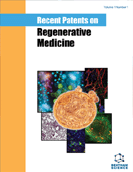Abstract
Umbilical cord mesenchymal stromal cells (UCMSCs) are isolated from Wharton’s jelly in the umbilical cord at birth, and offer advantages over adult mesenchymal stromal cells (MSCs) such as highly efficient isolation, faster proliferation in vitro, a broader differentiation potential, and non-invasive harvesting procedure. Their expansion and differentiation potential renders them a promising cell source for tissue engineering and clinical applications. This review discusses recent updates on the differentiation strategies for musculoskeletal tissue engineering including cartilage, bone, and muscle. In addition to tissue engineering applications, UCMSCs can be utilized to support hematopoiesis and modulate immune response. We review the patents relevant to the application of MSCs including UCMSCs in hematopoiesis and immune modulation. Finally, the current hurdles in the clinical translation of UCMSCs are discussed. During clinical translation, it is critical to develop large-scale manufacturing of UCMSCs as well as the composition of expansion and differentiation media. Four clinical trials to date have examined the safety and efficacy of UCMSCs. Once public banking of UCMSCs is available to supply matched allogeneic units and once UCMSC manufacturing is standardized, we anticipate that UCMSCs will be more widely used in clinical trials.
Keywords: Clinical study, commercialization, immune modulation, mesenchymal stromal cell, umbilical cord, Wharton’s jelly.
 12
12




